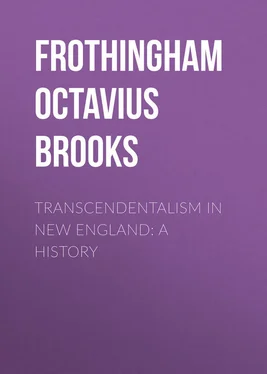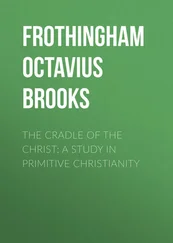Octavius Frothingham - Transcendentalism in New England - A History
Здесь есть возможность читать онлайн «Octavius Frothingham - Transcendentalism in New England - A History» — ознакомительный отрывок электронной книги совершенно бесплатно, а после прочтения отрывка купить полную версию. В некоторых случаях можно слушать аудио, скачать через торрент в формате fb2 и присутствует краткое содержание. Жанр: foreign_antique, foreign_prose, на английском языке. Описание произведения, (предисловие) а так же отзывы посетителей доступны на портале библиотеки ЛибКат.
- Название:Transcendentalism in New England: A History
- Автор:
- Жанр:
- Год:неизвестен
- ISBN:нет данных
- Рейтинг книги:4 / 5. Голосов: 1
-
Избранное:Добавить в избранное
- Отзывы:
-
Ваша оценка:
- 80
- 1
- 2
- 3
- 4
- 5
Transcendentalism in New England: A History: краткое содержание, описание и аннотация
Предлагаем к чтению аннотацию, описание, краткое содержание или предисловие (зависит от того, что написал сам автор книги «Transcendentalism in New England: A History»). Если вы не нашли необходимую информацию о книге — напишите в комментариях, мы постараемся отыскать её.
Transcendentalism in New England: A History — читать онлайн ознакомительный отрывок
Ниже представлен текст книги, разбитый по страницам. Система сохранения места последней прочитанной страницы, позволяет с удобством читать онлайн бесплатно книгу «Transcendentalism in New England: A History», без необходимости каждый раз заново искать на чём Вы остановились. Поставьте закладку, и сможете в любой момент перейти на страницу, на которой закончили чтение.
Интервал:
Закладка:
"What physical inquirer, since Euler, seeks anything in nature but forces and laws? Who now speaks of atoms? And even molecules, the old atoms revived – who defends them as anything but an hypothesis? If the fact be incontestable, if modern physics be now employed only with forces and laws, I draw the rigorous conclusion from it, that the science of Physics, whether it know it or not, is no longer material, and that it became spiritual when it rejected every other method than observation and induction, which can never lead to aught but forces and laws. Now what is there material in forces and laws? The physical sciences, then, themselves have entered into the broad path of an enlightened spiritualism; and they have only to march with a firm step, and to gain a more and more profound knowledge of forces and laws, in order to arrive at more important generalizations. Let us go still further. As it is a law already recognized of the same reason which governs humanity and nature, to refer every finite cause and every multiple law – that is to say, every phenomenal cause and every phenomenal law – to something absolute, which leaves nothing to be sought beyond it in relation to existence, that is to say, to a substance; so this law refers the external world composed of forces and laws to a substance, which must needs be a cause in order to be the subject of the causes of this world, which must needs be an intelligence in order to be the subject of its laws; a substance, in fine, which must needs be the identity of activity and intelligence. We have thus arrived accordingly, for the second time, by observation and induction in the external sphere, at precisely the same point to which observation and induction have successively conducted us in the sphere of personality and in that of reason; consciousness in its triplicity is therefore one; the physical and moral world is one, science is one, that is to say, in other words, God is One."…
"Having gained these heights, philosophy becomes more luminous as well as more grand; universal harmony enters into human thought, enlarges it, and gives it peace. The divorce of ontology and psychology, of speculation and observation, of science and common-sense, is brought to an end by a method which arrives at speculation by observation, at ontology by psychology, in order then to confirm observation by speculation, psychology by ontology, and which starting from the immediate facts of consciousness, of which the common-sense of the human race is composed, derives from them the science which contains nothing more than common-sense, but which elevates that to its purest and most rigid form, and enables it to comprehend itself. But I here approach a fundamental point.
"If every fact of consciousness contains all the human faculties, sensibility, free activity, and reason, the me, the not-me, and their absolute identity; and if every fact of consciousness be equal to itself, it follows that every man who has the consciousness of himself possesses and cannot but possess all the ideas that are necessarily contained in consciousness. Thus every man, if he knows himself, knows all the rest, nature and God at the same time with himself. Every man believes in his own existence, every man therefore believes in the existence of the world and of God; every man thinks, every man therefore thinks God, if we may so express it; every human proposition, reflecting the consciousness, reflects the idea of unity and of being that is essential to consciousness; every human proposition therefore contains God; every man who speaks, speaks of God, and every word is an act of faith and a hymn. Atheism is a barren formula, a negation without reality, an abstraction of the mind which cannot assert itself without self-destruction; for every assertion, even though negative, is a judgment which contains the idea of being, and, consequently, God in His fulness. Atheism is the illusion of a few sophists, who place their liberty in opposition to their reason, and are unable even to give an account to themselves of what they think; but the human race, which is never false to its consciousness and never places itself in contradiction to its laws, possesses the knowledge of God, believes in him, and never ceases to proclaim Him. In fact, the human race believes in reason and cannot but believe in it, in that reason which is manifested in consciousness, in a momentary relation with the me – the pure though faint reflection of that primitive light which flows from the bosom of the eternal substance, which is at once substance, cause, intelligence. Without the manifestation of reason in our consciousness, there could be no knowledge – neither psychological, nor, still less, ontological. Reason is, in some sort, the bridge between psychology and ontology, between consciousness and being; it rests at the same time on both; it descends from God and approaches man; it makes its appearance in the consciousness, as a guest who brings intelligence of an unknown world of which it at once presents the idea and awakens the want. If reason were personal, it would have no value, no authority, beyond the limits of the individual subject. If it remained in the condition of primitive substance, without manifestation, it would be the same for the me which would not know itself, as if it were not. It is necessary therefore that the intelligent substance should manifest itself; and this manifestation is the appearance of reason in the consciousness. Reason then is literally a revelation, a necessary and universal revelation, which is wanting to no man and which enlightens every man on his coming into the world: illuminat omnem hominem venientem in hunc mundum . Reason is the necessary mediator between God and man, the λογος of Pythagoras and Plato, the Word made flesh which serves as the interpreter of God and the teacher of man, divine and human at the same time. It is not, indeed, the absolute God in his majestic individuality, but his manifestation in spirit and in truth; it is not the Being of beings, but it is the revealed God of the human race. As God is never wanting to the human race and never abandons it, so the human race believes in God with an irresistible and unalterable faith, and this unity of faith is its own highest unity…
"If these convictions of faith be combined in every act of consciousness, and if consciousness be one in the whole human race, whence arises the prodigious diversity which seems to exist between man and man, and in what does this diversity consist? In truth, when we perceive at first view so many apparent differences between one individual and another, one country and another, one epoch of humanity and another, we feel a profound emotion of melancholy, and are tempted to regard an intellectual development so capricious, and even the whole of humanity, as a phenomenon without consistency, without grandeur, and without interest. But it is demonstrated by a more attentive observation of facts, that no man is a stranger to either of the three great ideas which constitute consciousness, namely, personality or the liberty of man, impersonality or the necessity of nature, and the providence of God. Every man comprehends these three ideas immediately, because he found them at first and constantly finds them again within himself. The exceptions to this fact, by their small number, by the absurdities which they involve, by the difficulties which they create, serve only to exhibit, in a still clearer light, the universality of faith in the human race, the treasure of good sense deposited in truth, and the peace and happiness that there are for a human soul in not discarding the convictions of its kind. Leave out the exceptions which appear from time to time in certain critical periods of history, and you will perceive that the masses which alone have true existence, always and everywhere live in the same faith, of which the forms only vary."
Читать дальшеИнтервал:
Закладка:
Похожие книги на «Transcendentalism in New England: A History»
Представляем Вашему вниманию похожие книги на «Transcendentalism in New England: A History» списком для выбора. Мы отобрали схожую по названию и смыслу литературу в надежде предоставить читателям больше вариантов отыскать новые, интересные, ещё непрочитанные произведения.
Обсуждение, отзывы о книге «Transcendentalism in New England: A History» и просто собственные мнения читателей. Оставьте ваши комментарии, напишите, что Вы думаете о произведении, его смысле или главных героях. Укажите что конкретно понравилось, а что нет, и почему Вы так считаете.












